
The Sims. Perhaps you've heard of it. The Sims is a game people play where ordinary, everyday people play as ordinary everyday people. A Sim can raise a family, meet neighbors, or get a job. Basically, Sims do just about everything the people who play them do. Re:coded is, in this sense, a game where the heroes of many worlds play as the heroes of many worlds. The digital characters fight heartless, solve a universe of problems, and try to determine the identity and purpose of mysterious figures. Basically, Kingdom Hearts Re:coded's digital Sora does just about everything Sora does.
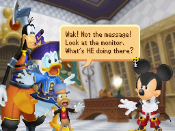
The premise of Re:coded's storyline is found in Jiminy Cricket's journal. His journal, which contains Sora's past adventures, has been digitized to discover the origin of a mysterious message. Players control a digital version of Sora, the recruit of King Mickey to help discover who placed the message in the journal. In the process, we learn the journal's data scan has some corruption, creating blocks and bugs that cause all sorts of problems for the digital world.
The datasphere of Re:coded's holds six distinct worlds. Sadly, the reality of Re:coded is that Sora has been to each of these worlds before. How couldn't he? The game chronicles the tale of a journal chronicling the tale of Sora. Simply put, content is reused. Bosses are reused. Enemies are reused. Worlds are reused. The normal combat is similar to the original Kingdom Hearts, though magic and special attacks have been changed up a bit. Anyone seeking a Kingdom Hearts game composed entirely of new content would almost certainly well to avoid Re:coded.
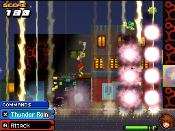
That said, it seems Square Enix recognizes Re:coded's abundant recycling of content. To combat repetitive moments and redone plotlines, Re:coded refashions how Sora revisits the game's reduced worlds. Partway through each world, Sora discovers the keyhole to each world, which he uses to find and eliminate the bugs down in the data's core. It sounds simple and rote, yes, but in reality, this is where Re: coded shines. Each world's core uses a different classic gameplay idea. One world's core is a sidescroller, one a turn-based RPG with action commands a la Super Mario RPG and another is an on-rails third-person shooter. This kind of variance provides a fresh perspective through many of Re:coded's repeat destinations.
Much of the original Kingdom Hearts's gameplay remains intact, where combat is concerned. Digital Sora begins with a three-hit combo, can cast spells, and use special moves. Enemies and Sora are nearly as animated as in the first game. To carry on the computer and programming theme, digital Sora levels up by placing chips onto an elaborate circuit board, conceivably similar to the sphere grid from Final Fantasy X, eventually unlocking abilities like a high jump and the roll dodge. Other chips are used to assign, level-up, and merge special abilities, like spells and special attacks. The circuit board is rife with “hacks and cheats,” too. Lowering Sora's HP raises the drop rate, for example. In effect, Re:coded is aware it's a game, and plays with the concept quite a bit. Often, where it does, it's fun, though sometimes the psuedo-programming aspects are a little too over-the-top and cheesy.
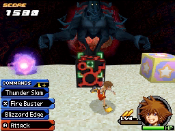
In an effort to provide a slight twist on the standard Kingdom Hearts hack and slash gameplay, sometimes an area in a world is “bugged,” essentially breaking it and preventing passage through a tunnel, or something similar. Sora travels into the bugged sector into a more digital-looking part of the digital world. Similar to multi-floored dungeons, bugged sectors have red rooms and blue rooms, and while heartless appear in both types, bugged heartless only appear in the red rooms. The bugged heartless must be defeated to progress, which sounds simple at first, but there's a little trick: Players can often gamble points on whether a floor-specific goal can be met. Sometimes the goal is “Miss less than 7 times!” and sometimes it's “Don't use healing magic!” These challenges can be difficult, but at the end of each sector, a handful of items are available for purchase using the score accumulated in the specific sector. Unfortunately, Re:coded's theme of reutilization comes into play, as there's only a handful of rooms available to make up sector floors. What was before a great idea to provide a new perspective on the hack-and-slash Kingdom Hearts gameplay becomes repetitive and redundant over the length of the game.
While many of the bosses in Re:coded are fought through the altered world data cores mentioned above, a few are taken on through a more traditional means. Unfittingly convoluted, many of these bosses are parsed with cutscenes. To be more clear, one boss might contain three fights. After the first fight, the boss says something more like “Now I'm serious!” and then adds one new attack to his repertoire. After the second fight, the boss says something like “Now I'm more serious!” and adds one more move. This doesn't happen often, but it feels tacky and awkward. It isn't as though there's a new form of the boss - it's simply a new move being added in.
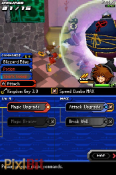
Given the history and story of the Kingdom Hearts titles, fans typically expect an interesting story with surprises, character, and plot development. Unfortunately, Re:coded seems to lack all of these. While a handful of cutscenes look great, regardless of platform, the majority of story-based themes use lifeless still images and speech bubbles. Disney characters are mostly simple caricatures of their mainline Kingdom Hearts personas, which, in most cases, were already a bit simple compared to the original Disney movies. It's made clear digital Sora's memories and the events that happen in Re:coded's datasphere are utterly meaningless, except in determining the purpose behind the hidden message mentioned in the game's prelude. While avoiding spoilers, even the mystery is a rehash of major plotlines of a few other Kingdom Hearts games. The lack of focus and purpose in Re:coded's story makes it clear that the title was originally conceived and created as a cell phone game, and while the gameplay has been upgraded to that of a full retail game, the story, itself, isn't up to Kingdom Hearts or Square Enix's typical calibur.
The bottom line is fairly straightforward. Kingdom Hearts: Re:coded is a game with reused enemies, bosses, and plot points. Re:coded serves no notable purpose in the overarching story of Kingdom Hearts. The worlds have been done and feel a bit aged, especially in their downsized DS form, but at the same time, the game's combat is nearly as full and lively as the original titles. I can't wholeheartedly recommend Kingdom Hearts: Re:coded to the average Kingdom Hearts fan, since this game is basically pieces of other Kingdom Hearts games, and I also can't recommend it to newcomers to the franchise, since much of the story and characters is explained outside of Re:coded. In the end, I must conclude Kingdom Hearts: Re:coded is for Kingdom Hearts fans who love the gameplay, want a tiny glimpse on where the story is headed, or both. Everyone else should try to focus on the mainline Kingdom Hearts titles.













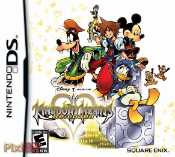

Comments